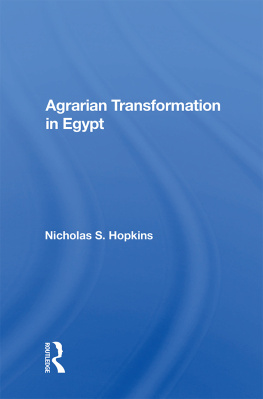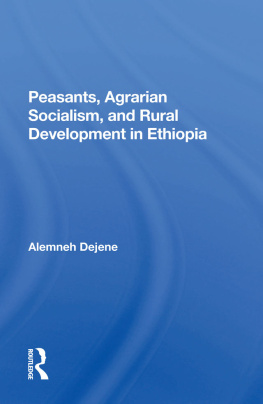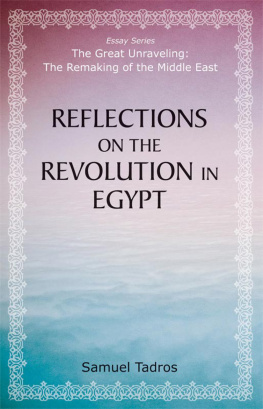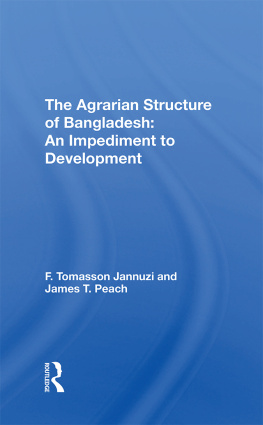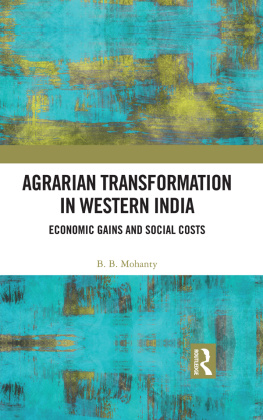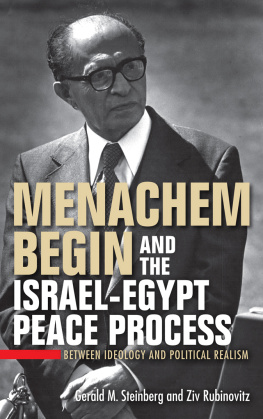In a process that began in 1979 and continues to the present, 1 have received the support and encouragement of many people. Most of all there are the people in the village of Musha itself, who tolerated my presence and made the experience enjoyable.
I was introduced to Musha in 1979 by the Catholic Relief Services (CRS) office in Cairo, which was looking for someone to conduct a survey on the social aspects of animal husbandry. I am grateful to the CRS and especially to its director, Mr. Andrew Koval, for providing this initial contact and for continued support over the years, especially through the CRS Asyut office. Engineer Ahmed Bahgat was most helpful at different times, as were the directors of the Asyut office.
1 am grateful to a number of organizations for their help in making this research possible. The funding for a year of research in 1980-81 was provided by the American Research Center in Egypt and the Middle East Awards Program, administered by the Population Council office in Cairo. The American University in Cairo granted me a year of leave for the research and also a sabbatical leave two years later that allowed me to make the first draft of the results. While on sabbatical in 1982-83, 1 was appointed to the Center for Middle Eastern Studies at Harvard University. 1 am grateful to the Center and its then director, Professor Edward Keenan, for accepting me there as a visiting scholar.
My local support was provided by Asyut University, thanks to the good agency of Professor Mohammed Helmi el-Gibali of the Faculty of Agriculture. Dr. el-Gibali also helped me locate a research assistant. Moreover, I profited from my contacts with many faculty members at Asyut University, notably Professors Bahgat Abdelmaksoud and Ragaa Amir.
Much of my time in the field was spent with my chief field assistant, Mr. Sabr Imam, and with my village guide, the dallal, Mr. Ahmed Mahmoud. Without their patient help, this research would not have been possible.
I am indebted to the people of Musha, particularly the late Mr. Abdelmajid Mohammed Tammam, the Cimda of Musha and former deputy in the Egyptian parliament, for his hospitality and friendship. I also owe a large bouquet of thanks to Mr. Salah Abdin, President of the Local Popular Council and my immediate host in the village, for support and advice. Too many people in Musha gave me hospitality and help in the course of my stays there for me to single out only a few. But 1 want to mention three families where I found a home-like atmosphere: the Adolf Jabra Jirjis family, the Mustafa Mohran family, and the Ahmed Mahmoud family.
A team of field assistants from the American University of Cairo took charge of interviewing the women: Jehan Attia, Maha Adly Guindi, Suzan Ahmed Lutfi Mubarek, and Nadia Adel Taher. They were enthusiastically assisted by a quartet of young women from Musha. In June 1981 Afaf alBassam accompanied me to the field to inquire into matters of local administration.
Substantial help with the data analysis in the early phases was provided by Lina Hediah, Maha Adly Guindi, and Maha Fathallah. The final preparation of the manuscript would not have been possible without the intelligent and critical help of Hanan Hosni Sabea.
Without in any way implicating them in the result, I would like to thank many friends for conversations in various contexts over the years: Donald Cole, Robert Femea, Saad Gadalia, John Qerhart, Laila el-Hamamsy, Iliya Harik, Allen Hoben, Robert Hunt, Rick Huntington, Sohair Mehanna, Soheir Morsy, Cynthia Nelson, Alan Richards, and Lucie Wood Saunders. Many of these conversations were only made possible by the concerned and knowledgeable intellectual atmosphere at the American University in Cairo.
Finally, I wish to express my gratitude and devotion to my family.
Let me turn now to the orientalist's revenge, transliteration. Arabic words written in italics are written in a simplified transliteration based on the system of the International Journal of Middle East Studies. Grammatical plurals required by English are written by adding an "s"; "Shaykh" and "Umda," written as ordinary words, are used to refer to particular individuals, as the context will make clear. Place names are based on those used in the Survey of Egypt maps. Measures are treated as English words. Personal names are all pseudonyms and are written in the way common in Egypt, This approach makes for some inconsistency but should aid comprehension in other ways.
Prices are given in Egyptian pounds (LE), divided into 100 piasters (PT). At the time of field work, an Egyptian pound was worth US$.83.
Nicholas S. Hopkins

